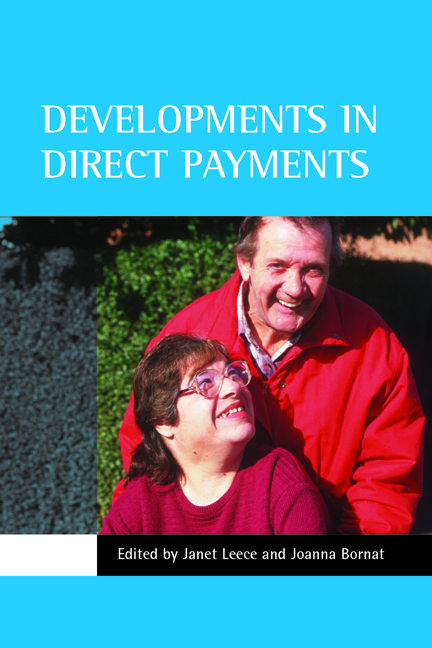Book contents
seventeen - Care managers and direct payments
Published online by Cambridge University Press: 18 January 2022
Summary
“Direct payments can offer people a new beginning and a chance of a better quality of life.” (Care manager)
Direct payments offer the opportunity for older people to have far greater power, choice and control over the way their support is delivered (Leece, 2001; Clark et al, 2004). Yet despite the growing merits of using direct payments with older people, the indications are that their take-up of direct payments remains low. With high expectations by the government that local authorities will significantly increase the number of older people using direct payments, the possible barriers affecting take-up need to be explored.
This chapter briefly explains the background to direct payments and details findings from a study of two areas in one local authority, undertaken early in 2003 for a post-qualifying award in social work. Previous research has identified that care managers are key to enabling older people to access direct payments (see Glasby and Littlechild, 2002; Clark et al, 2004), and this study explores care managers’ knowledge, confidence and views about direct payments, to consider whether these factors have influenced the take-up by older people. The study posed three research questions: what is the level of care managers’ knowledge of direct payments (the term ‘care manager in this study refers to a social worker or an unqualified social care assessor)? Do care managers feel confident about advising and implementing direct payments with service users? Do care managers feel that direct payments are a good way of meeting service users’ needs?
Background
The 1996 Community Care (Direct Payments) Act, implemented in April 1997, originally limited eligibility to people under 65 years of age but was extended to include older people from 1 February 2000. While the power to provide direct payments was initially optional, it became a mandatory duty upon local authorities to offer direct payments to service users in April 2003 (after this research was undertaken), under the 2001 Health and Social Care Act (see DH, 2001). There are no studies as yet that examine whether making direct payments a duty has made a difference to care managers’ practice with regard to direct payments, although early data from a survey of all local authorities in England, gathered almost a year after direct payments were made mandatory, found that on average 58% of service users with physical or sensory disabilities said their care manager had not told them about direct payments (DH, 2004).
- Type
- Chapter
- Information
- Developments in Direct Payments , pp. 237 - 250Publisher: Bristol University PressPrint publication year: 2006

